

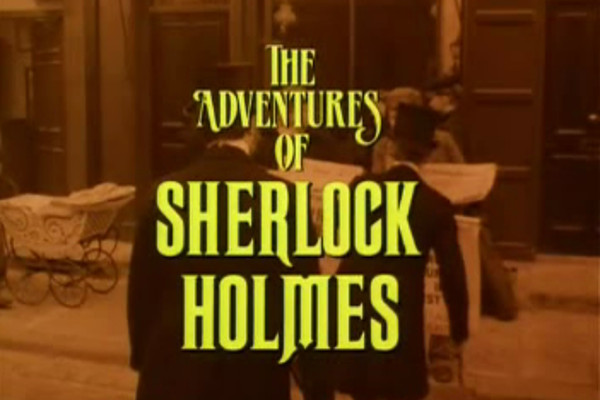
Anorak: We've got something a little different for you this time, Zoner. For the first time a "Worst To Best" article isn't written by me, but by someone who likes the site and wanted to write their own "worst to best" article.
As a warning, then this one does contain discussion of the endings of many of the stories, so be aware if you haven't seen the shows in question.
You can buy The Complete Sherlock Holmes Collection from Amazon. We'll hand over to Ian Cawood for his take on the Granada Sherlock Holmes stories with Jeremy Brett...
Michael Cox, a producer at Granada and a great fan of the Sherlock Holmes stories, was able to persuade his superiors on the board of the company that, given the huge critical success of Granada's Brideshead Revisited in 1981, a faithful adaptation of Conan Doyle's stories would tap into the same romantic nostalgia that was sweeping Britain as it faced the worst economic downturn since the Second World War.
Cox knew that casting the lead was crucial, so approached Jeremy Brett, who had failed to launch his career in Hollywood and had returned to England in 1982. Brett, sensing an opportunity to finally fulfil his potential, seized the chance to bring the definitive Holmes to the screen. An entire late Victorian street was constructed at Granada's Manchester studios which would feature in almost every episode - the care and attention to detail with which it was built could be witnessed on the studio tour which Granada offered in the '80s and '90s.
Some of the best screenwriters were brought in to adapt Arthur Conan Doyle's often unsatisfying stories and some of the finest stage and screen actors were hired, together with the RSC's David Burke (father of Tom) who would play a younger, more dynamic Dr Watson than the bumbling incompetent which Nigel Bruce had depicted in his films with Basil Rathbone.
American co-production money was lavished on the series and Brett appeared to have fully immersed himself in the role, committing to the series for as long as it lasted. What could possibly go wrong?
Well, almost everything – the story of Granada's Sherlock Holmes behind-the-scenes is often more riveting than what appeared on screen. There was the tragic death of the leading man's wife at the height of the series' success, his descent into depression, mania and drug-dependency. There was the need to recast the main supporting role, the financial decline of Granada and the change in producer as Cox was forced out and a less sympathetic manager was brought in to maximise the series' returns whilst reducing the budget.
There were changes in the format of television thrillers, as short period drama was increasingly replaced with longer-format, contemporary drama in the later '80s, often with disturbing storylines of rape, incest and child cruelty, to which the series was expected to respond. And finally, the leading actor's health broke and he was unable to appear in several of the stories of the final series.
And yet, despite all of this, Granada's Sherlock Holmes remains one of the triumphs of British television, still repeated, still loved, still measured as the greatest of the adaptations of Arthur Conan Doyle's stories, which became increasingly obvious as Stephen Moffat and Mark Gatiss's twenty first century setting of the series swiftly descended into pastiche, self-parody and soap opera after its initial six episodes.
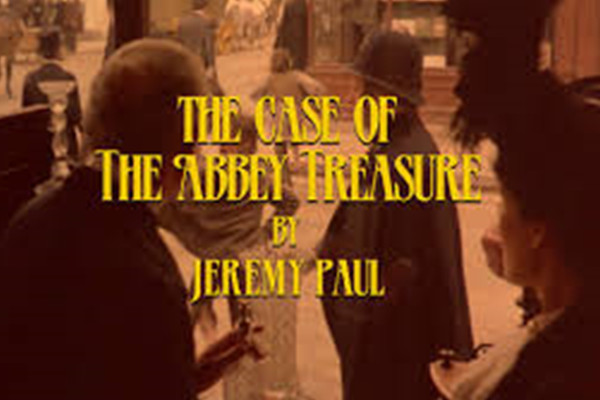
Brett's Holmes and Hardwicke's Watson in a television advert for a building society? Yes. And it is probably the moment when the series jumped the shark, as there is only one episode from the rest of the series in the top twenty, in my opinion. I cannot believe that the actors needed the money, but I can believe that Granada did by this point, as Mrs Thatcher's deregulation of the media started to hit the old commercial television companies. One can see Brett flinching while Hardwicke does his level-best not to snigger as he reads a load of codswallop about a letter from the future revealing how rich their pageboy's grandchildren (surely great grandchildren?) will be by 1988. It was clearly made in about half an hour as filming wrapped on 1988's 'Hound of the Baskervilles' and I'm quite pleased Abbey National got taken over by Santander after inflicting this on an unsuspecting ITV audience.

Rarely seen (with good reason), this was part of ITV's charity 'Telethon' in 1992, in which four TV detectives investigated a double murder linked to some missing jewellery. Brett's Holmes and Hardwicke's Watson start off the case for ten minutes, before leaving it unsolved, as Holmes has a pressing appointment with Professor Moriarty in Switzerland.
With commercial breaks and appeals for donations between each segment, it then shifts to Amsterdam, for Barry Foster's Van Der Valk to moon about the canals, then to Glasgow for Mark McManus's Taggart to scowl at everyone, before Decider Login himself (George Baker's Inspector Wexford), finally gets to solve the problem, extremely unconvincingly.
It is probably one of the most ham-fisted pastiches of Sherlock Holmes this side of Guy Ritchie's ego, with some of the worst supporting actors I've ever seen on television. And then Hardwicke breaks the fourth wall as the two of them depart, having failed to achieve anything, apart from damaging the series' reputation. As with the previous travesty, don't hunt this out, as it will only ruin the series for you.
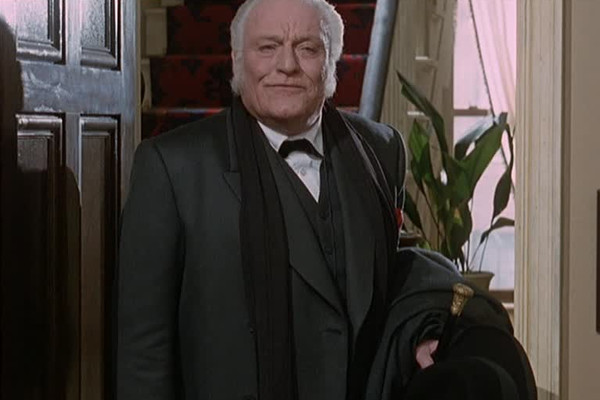
Sherlock Holmes, without Sherlock Holmes? How's that going to work then? Well, about as well as an Arthur Conan Doyle story narrated by Holmes instead of Watson (see 'The Lion's Mane' in case you are wondering) – i.e. not at all. So, what did the screenwriter, Gary Hopkins, do, when faced with the physical collapse of his main actor and his possible imminent death? Well, quite logically, he brought back Mycroft Holmes, portrayed with all the usual sardonic wit that Charles Gray had brought on his three previous appearances in the role since 1985.
Quite illogically, however, he decided to combine two of ACD's lesser stories, 'The Adventure of the Mazarin Stone' and 'The Adventure of the Three Garridebs' into a single script which is by turns contradictory, bewildering and just plain daft. And then, possibly to distract the audience from the fact that the title character is almost completely absent from the programme, the director, Peter Hammond, decides to outdo his bizarre choice of shots which so undermined 'The Eligible Bachelor' with some of the worst editing and mise-en-scene ever to have appeared on British television.
It is a confusing, over-acted, under-rehearsed mess, put together by a man who clearly decided that, as the series was ending and he was about to retire, Granada would accept any old nonsense. Just thank goodness it wasn't the final episode and that Brett was somehow able to take the role for a final time in 'The Cardboard Box'.
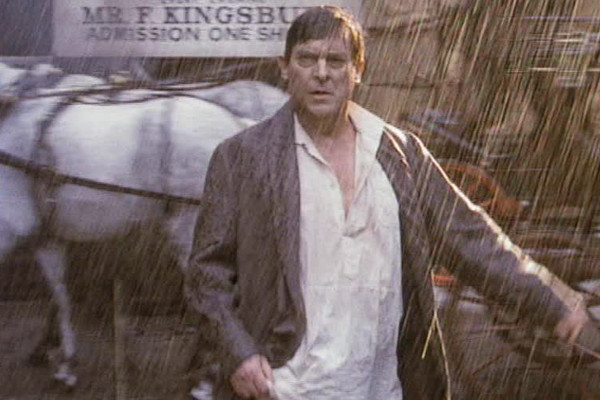
As Michael Cox noted, by this time Granada's attitude was 'don't worry about the quality, just fill the time slot!' If the series had finished here, we would have missed some of the better quality episodes of The Memoirs such as 'The Dying Detective' and 'The Cardboard Box', but Brett's health may not have deteriorated as precipitously as it did during the filming of the last series (though he clearly did not have long to live) and we would have been spared 'The Mazarin Stone.' To be honest, I wish this had never been made. Brett is far too ill to challenge all the indignities which his character is forced to endure, not least of which is his alarming suggestion that dreams may act as premonitions, and the way director Peter Hammond has him wandering around in his nightshirt for half the runtime. The great logician, the great detective, the master sleuth, the Hamlet of crime reduced to this? Shame on them.
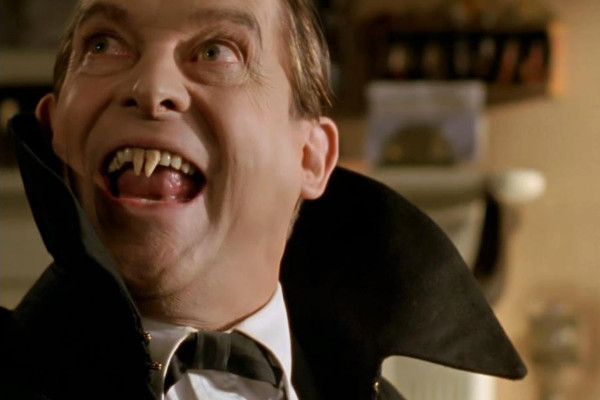
This is marginally less bad than the 'Eligible Bachelor' – why? Well probably because Roy Marsden, despite being horribly miscast, does his level best with the arrant nonsense he is forced to come out with and which the audience is forced to endure for two bloody hours (no pun intended). One can play 'just imagine' and think what a legendary scenery chewer like Tom Baker (who himself famously failed disastrously as Holmes in the BBC's own Hound of the Baskervilles shortly after leaving Doctor Who) or Ian Richardson could have done with the part.
But one is forced to concede that even the RSC couldn't have turned this particular sow's ear of a script into a silk purse, even if they had a better director than the inexperienced Tim Sullivan to organise the farrago. What elevates it above the other terrible TV movie of 1993? Brett and Hardwicke, of course. Although when Holmes starts mincing about pretending to be a vampire, hissing at Watson whilst wearing a pair of prosthetic fangs, you just want it all to stop, for everyone's sake.